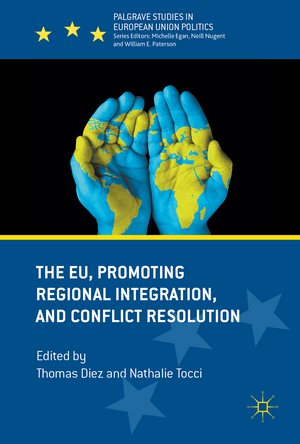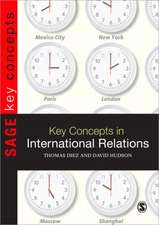The EU, Promoting Regional Integration, and Conflict Resolution: Palgrave Studies in European Union Politics
Editat de Thomas Diez, Nathalie Toccien Limba Engleză Hardback – 23 feb 2017
| Toate formatele și edițiile | Preț | Express |
|---|---|---|
| Paperback (1) | 890.68 lei 6-8 săpt. | |
| Springer International Publishing – 20 iul 2018 | 890.68 lei 6-8 săpt. | |
| Hardback (1) | 895.89 lei 6-8 săpt. | |
| Springer International Publishing – 23 feb 2017 | 895.89 lei 6-8 săpt. |
Din seria Palgrave Studies in European Union Politics
- 20%
 Preț: 691.32 lei
Preț: 691.32 lei - 20%
 Preț: 691.52 lei
Preț: 691.52 lei - 9%
 Preț: 798.62 lei
Preț: 798.62 lei - 20%
 Preț: 755.99 lei
Preț: 755.99 lei -
 Preț: 282.28 lei
Preț: 282.28 lei - 18%
 Preț: 889.75 lei
Preț: 889.75 lei - 20%
 Preț: 690.39 lei
Preț: 690.39 lei -
 Preț: 243.89 lei
Preț: 243.89 lei -
 Preț: 388.72 lei
Preț: 388.72 lei -
 Preț: 388.72 lei
Preț: 388.72 lei -
 Preț: 393.52 lei
Preț: 393.52 lei -
 Preț: 392.60 lei
Preț: 392.60 lei -
 Preț: 390.25 lei
Preț: 390.25 lei -
 Preț: 390.63 lei
Preț: 390.63 lei -
 Preț: 389.70 lei
Preț: 389.70 lei -
 Preț: 387.96 lei
Preț: 387.96 lei -
 Preț: 391.61 lei
Preț: 391.61 lei -
 Preț: 391.61 lei
Preț: 391.61 lei -
 Preț: 392.60 lei
Preț: 392.60 lei -
 Preț: 386.81 lei
Preț: 386.81 lei -
 Preț: 390.63 lei
Preț: 390.63 lei -
 Preț: 386.00 lei
Preț: 386.00 lei -
 Preț: 392.60 lei
Preț: 392.60 lei -
 Preț: 388.72 lei
Preț: 388.72 lei - 15%
 Preț: 645.79 lei
Preț: 645.79 lei -
 Preț: 391.61 lei
Preț: 391.61 lei - 15%
 Preț: 645.47 lei
Preț: 645.47 lei -
 Preț: 392.21 lei
Preț: 392.21 lei -
 Preț: 386.81 lei
Preț: 386.81 lei -
 Preț: 390.63 lei
Preț: 390.63 lei -
 Preț: 390.63 lei
Preț: 390.63 lei -
 Preț: 387.75 lei
Preț: 387.75 lei -
 Preț: 389.88 lei
Preț: 389.88 lei -
 Preț: 388.52 lei
Preț: 388.52 lei -
 Preț: 391.61 lei
Preț: 391.61 lei -
 Preț: 400.26 lei
Preț: 400.26 lei -
 Preț: 387.75 lei
Preț: 387.75 lei -
 Preț: 386.81 lei
Preț: 386.81 lei -
 Preț: 388.72 lei
Preț: 388.72 lei -
 Preț: 389.88 lei
Preț: 389.88 lei -
 Preț: 391.61 lei
Preț: 391.61 lei -
 Preț: 389.70 lei
Preț: 389.70 lei -
 Preț: 386.81 lei
Preț: 386.81 lei -
 Preț: 389.88 lei
Preț: 389.88 lei -
 Preț: 388.72 lei
Preț: 388.72 lei - 15%
 Preț: 643.48 lei
Preț: 643.48 lei - 15%
 Preț: 582.63 lei
Preț: 582.63 lei -
 Preț: 398.35 lei
Preț: 398.35 lei - 15%
 Preț: 644.18 lei
Preț: 644.18 lei
Preț: 895.89 lei
Preț vechi: 1092.56 lei
-18% Nou
Puncte Express: 1344
Preț estimativ în valută:
171.42€ • 178.98$ • 141.88£
171.42€ • 178.98$ • 141.88£
Carte tipărită la comandă
Livrare economică 04-18 aprilie
Preluare comenzi: 021 569.72.76
Specificații
ISBN-13: 9783319475295
ISBN-10: 3319475290
Pagini: 335
Ilustrații: XXVII, 336 p. 2 illus. in color.
Dimensiuni: 148 x 210 x 25 mm
Greutate: 0.59 kg
Ediția:1st ed. 2017
Editura: Springer International Publishing
Colecția Palgrave Macmillan
Seria Palgrave Studies in European Union Politics
Locul publicării:Cham, Switzerland
ISBN-10: 3319475290
Pagini: 335
Ilustrații: XXVII, 336 p. 2 illus. in color.
Dimensiuni: 148 x 210 x 25 mm
Greutate: 0.59 kg
Ediția:1st ed. 2017
Editura: Springer International Publishing
Colecția Palgrave Macmillan
Seria Palgrave Studies in European Union Politics
Locul publicării:Cham, Switzerland
Cuprins
Introduction: Promoting Regional Integration and Transforming Conflicts?.- Adapting to regional challenges? The Brussels perspective on the promotion of regional integration and conflict transformation.- PART 1: Regional Integration and Conflict Resolution in the Middle East and North Africa.- Introduction: Middle East and North Africa.- Israel-Palestine: The Mediterranean Paradox.- Western Sahara: A “head-in-the-sand” approach to Maghrebi Integration.- Regional Integration and Conflict Resolution in Western and Eastern Africa.- PART 2: Regional Integration and Conflict Resolution in Western and Eastern Africa.- Introduction: Conflict and regionalism in Africa: framing the role of the EU.- The EU and regional integration in West Africa: what effects on conflict transformation?.- The Great Lakes and the EU: formal and informal regionalism and conflict transformation.- PART 3: Conflict and Regionalism in Latin America.- Introduction: The EU, Regional Conflicts and the Promotion ofRegional Cooperation: A Successful Strategy for a Global Challenge?.- The EU, Regional Conflicts and the Promotion of Regional Cooperation: A Successful Strategy for a Global Challenge? – Colombia’s case.- The EU, Regional Conflicts and the Promotion of Regional Cooperation: A Successful Strategy for a Global Challenge? – Honduras case.- PART 4: Conflict and Regionalism in Asia.- Introduction: The EU, Regional Cooperation and Regional Conflicts: The case of the South China Sea Territorial disputes and the North Korean Nuclear Crisis.- The EU and Regional Integration as a Form of Conflict Transformation in the South China Sea.
Notă biografică
Thomas Diez is Professor of Political Science and International Relations at the University of Tübingen, Germany. He is the editor of A Different Kind of Power? The EU’s Role in International Politics (2014) and recipient of the 2009 Anna Lindh Award in European Foreign and Security Policy Studies.
Nathalie Tocci is Deputy Director of Istituto Affari Internazionali, Italy, Honorary Professor at the University of Tübingen, Editor of The International Spectator and Special Adviser to EU High Representative Federica Mogherini, on behalf of whom she drafted the EU Global Strategy.
Nathalie Tocci is Deputy Director of Istituto Affari Internazionali, Italy, Honorary Professor at the University of Tübingen, Editor of The International Spectator and Special Adviser to EU High Representative Federica Mogherini, on behalf of whom she drafted the EU Global Strategy.
Textul de pe ultima copertă
This book provides a comprehensive study into the promotion of regional integration as a central pillar of European Union (EU) relations with the rest of the world. It is a strategy to deal with a core security challenge: the transformation of conflicts and, in particular, regional conflicts. Yet to what extent has the promotion of regional integration been successful in transforming conflicts? What can we regard as the core mechanisms of such an impact? This volume offers a comprehensive assessment of the nexus between promoting integration and conflict transformation. The authors systematically compare the consequences of EU involvement in eight conflicts in four world regions within a common framework. In doing so, they focus on the promotion of integration as a preventative strategy to avoid conflicts turning violent and as a long-term strategy to transform violent conflicts by placing them in a broader institutional context. The book will be of use to students and scholars interested in European foreign policy, comparative regionalism, and conflict resolution.
Caracteristici
Evaluates whether the EU's promotion of regional integration has lead to conflict transformation Argues that the effect of regional integration is dependent on the EU’s credibility, its alignment with other global actors and its engagement with local actors Promotes the need for more and deeper social learning on the side of the EU






